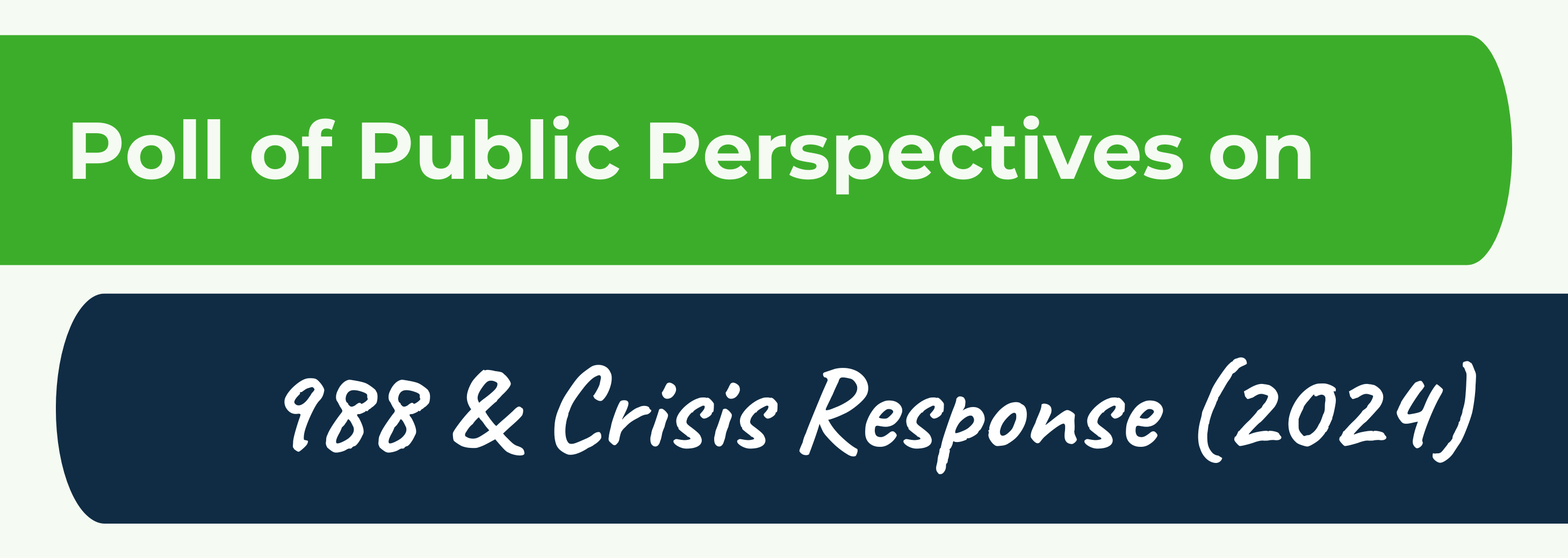
A NAMI-Ipsos poll conducted in Summer 2024 found that most Americans remain unfamiliar with the 988 Suicide & Crisis Lifeline. However, people who are familiar show stronger trust in and likelihood of using 988, highlighting the need for increased public awareness and education. Additionally, the poll found consistently strong support for policies and funding to strengthen 988 call centers and related crisis services. Dig into the results further with this slide deck.
Jump to Key Findings:
- Key Findings on 988
- Key Findings on Funding 988 and Crisis Services
- Key Findings on Crisis Response
- Other Key Findings
- Resources
Key Findings on 988:
- Familiarity with the 988 Suicide & Crisis Lifeline is stable from October 2023 but has slightly increased from this time last year (June 2023).
- 67% say they are aware of 988, which means they’ve at least heard of it.
- Only 23% say they are at least somewhat familiar with 988.
- When asked what would be most important if they needed to contact the 988 Suicide & Crisis Lifeline for themselves or another person, the top three most important were:
- Being able to speak with a crisis counselor immediately (51%)
- Health care professionals would arrive to the scene of the crisis first (27%)
- Not receiving a bill for contacting the 988 Suicide & Crisis Lifeline (23%)
- 3% of Americans say they or a loved one have contacted the 988 Lifeline while they were having a mental health, substance use, or suicide crisis.
- Black, Hispanic, and AAPI Americans are more likely than white Americans to say they or a loved one have contacted the 988 Lifeline for themselves (6%, 5%, 5% vs. 2%, respectively).
- Among Americans who say they or a loved one contacted the 988 Lifeline, about seven in ten (68%) say they got the help they needed.
- This has improved by 13 percentage points from June 2023.
- 82% say they trust that they would receive the help they need from the 988 Lifeline if they needed to contact it.
- Most Americans (72%), regardless of race or ethnicity, are comfortable contacting the 988 Lifeline during a mental health crisis.
- Younger Americans aged 18-29 are less likely than older Americans ages 50+ to reach out for professional support during a mental health crisis or emergency.
- However, about half (51%) of Americans aren’t sure when a situation is serious enough to contact the 988 Lifeline.
Key Findings on Funding 988 and Crisis Services:
- Most Americans support funding the 988 Lifeline regardless of party affiliation or registered voter status.
- 83% support providing federal funding for 988 & crisis response services
- 83% support providing state funding for 988 & crisis response services
- After receiving messaging about existing monthly 911 monthly phone bill fees, Americans are willing to pay a slightly higher monthly fee to fund 988 Lifeline operations – a bump of $0.12 more they’d be willing to pay. In fact, the number of people willing to pay more than 50 cents for a 988 monthly fee – higher than many state fees enacted – was 54% after learning about 911 fees.
- Just under half of Americans (49%) say Congress should highly prioritize funding the 988 Lifeline. 61% say Congress should highly prioritize funding for mental health care.
Key Findings On Crisis Response:
- A majority of Americans (86%) continue to say that when someone is in a mental health or suicide crisis, they should receive a mental health response, not a police response.
- LGBTQ+ Americans and Americans who have seen a mental health provider are more likely than their counterparts to say someone in a mental health or suicide crisis should receive a mental health response (93% for both vs. 85% and 83%, respectively).
- Nearly half of Americans (45%) say they wouldn’t feel safe calling 911 for help if their loved one was having a mental health crisis.
- Black (77%), Hispanic (72%) and LGBTQ+ (80%) Americans say they would be afraid the police may hurt their loved one or themselves while responding to a mental health crisis, and Black (28%) and AAPI (28%) Americans are significantly less comfortable going to a law enforcement officer in a crisis than white (43%) or Hispanic (40%) Americans.
Other Key Findings:
- Most Americans say Congress is doing too little to address the current state of mental health in the United States – including 57% of registered voters.
- 42% of Americans also say the same about their state’s governor and 46% about their state legislature.
Resources:
- Press Release: NAMI Polling and State Legislative Brief Highlight Opportunities to Improve Federal and State Mental Health Crisis Response After Two Years of 988 Lifeline
- Poll Topline Results & Methodology
- Poll Research Slide Deck
- 988: Reimagining Crisis Response
- #ReimagineCrisis Campaign
- NAMI’s 988 Crisis Response State Legislation Map
- 2023 NAMI Legislation Report Issue Brief: Trends in State Policy: 988 and Reimagining Crisis Response

